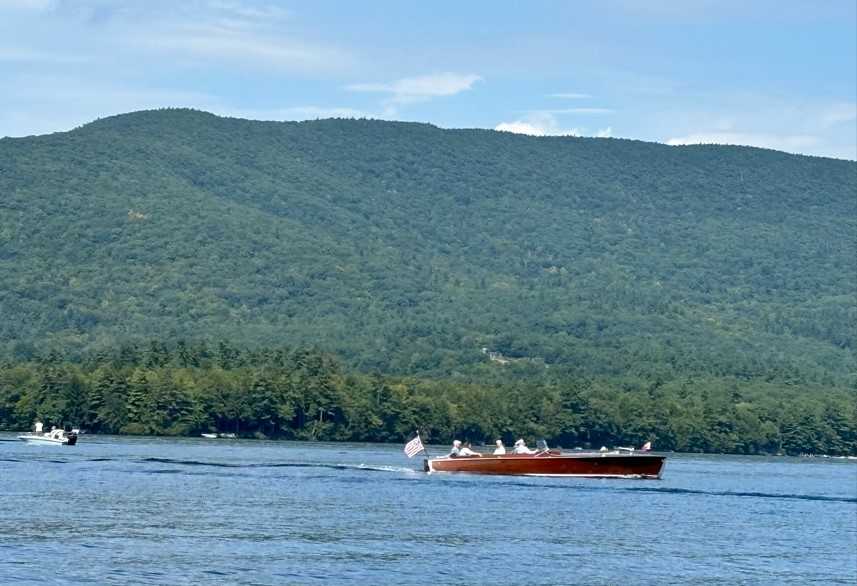By PAULA TRACY, InDepthNH.org
CONCORD – New Hampshire could get a new loon license plate if House Bill 105 is passed.
It is part of a suite of four “Lake Friendly” bills which are being advanced this year, all of which had hearings on Tuesday and Wednesday.
The plate, which would cost $30, and be similar to the moose plate https://www.mooseplate.com/, would have the money directed to fight the growing problem of cyanobacteria.
The House Transportation Committee heard the first bill Tuesday with its prime sponsor, state Rep. Rosemarie Rung, D-Merrimack.
She said this would be a non-tax revenue resource which would help what has become a significant problem for lakes. This blue-green colored algae can have toxic blooms that have both health and economic impacts.
“Cyanobacteria blooms are increasing in our lakes and, when toxic, can make people, pets, and wildlife seriously ill. Recurring and prolonged cyanobacteria blooms can reduce shoreline property values and negatively impact tourism and the economy. More funding is needed to mitigate these increasing blooms,” an advisory for the bill by NH Lakes Association reads.
To deal with blooms that re-occur, lakes need extensive and expensive watershed management plans before scientists can best tackle the problem and changes can be made.
White Oak Pond in Holderness recently received a $100,000 grant from the Department of Environmental Services for a watershed plan after incidents over the years have shown the lake suffering from cyanobacteria. White Oak Pond flows into Big Squam Lake.
While in 2022 the legislature set aside $1 million following a study of the problem, and $500,000 was added to the fund in federal American Rescue Act funds, only about $200,000 is left in state coffers to fund those future plans and there is a long list, legislators were told.
Amy Smagula, who is director of the Limnology Center at the Department of Environmental Services, did not take a position on the bill but added information noting that in recent years the state has seen “unprecedented numbers” of cyanobacteria warnings.
InDepthNH.org reported an extensive series of stories on the problem this summer.
Both state Reps. Katy Peternel, R-Wolfeboro, and John MacDonald, R-Wolfeboro Falls, spoke in support of the measure while Peternel said she especially liked the fact that the bill would not add to the tax burden.
But some members of the committee noted they were not sure that the license plate would cover all the costs of creating these plans.
“It’s not going to be a solution but it will help,” said Andrea LaMoreaux, president and policy advocate for the New Hampshire Lakes Association. She said lake association groups across the state have indicated their interest and support in the loon plate and while there may be some who swap out the moose plate for a loon plate, she said many have indicated they would only be interested in the loon plate.
Rung said the moose plate, in its years since 2001, has generated $30 million in revenue for conservation in the state.
An official from the Department of Motor Vehicles did not take a position but said the effort would not have a major fiscal impact on the office to develop a loon plate.
This bill is among four “Lake Friendly” bills being promoted by NH Lakes Association and the other three were subject of public hearings on Wednesday.
House Bill 422 would increase penalties for violations of the Shoreland and Water Quality Protection Act.
It increases the penalty that the New Hampshire Department of Environmental Services may levy upon any person who violates the act taking the penalty from $5,000 to up to $15,000 per violation.
The Shoreland Water Quality Protection Act establishes a protected shoreland area close to lakes, rivers, and streams.
Within this area, vegetation removal, excavation, fill, fertilizer use, and development activities are regulated to safeguard waterbody health. The fines for violations of the act have not increased with the cost of inflation over the years.
Advocates said increasing the fines for violations may serve as an increased deterrent for people to knowingly violate the Act. With increased compliance, lakes would be cleaner and healthier.
It was heard by the House Resources, Recreation and Development Committee.
Also heard Wednesday is House Bill 332, allowing for the establishment of a village district to protect and remediate surface waters.
It would enable multiple municipalities surrounding a lake to form a village district in an area around the lake to protect and restore lake health.
Unlike a general town government, a village district is a special, limited-purpose form of government established to address a particular need within a community.
Finally, HB 416, was heard as well, prohibiting the intentional disposal of yard waste into the surface waters of the state.
Leaves, grass clippings and garden debris tossed into the surface waters degrade the lake quality adding to the problem of cyanobacteria and this would create a penalty for doing so.
Yard debris dumped into lakes adds nutrients (phosphorus and nitrogen) that fuel the excessive growth of plants, algae, and cyanobacteria.
It was heard by the House Criminal Justice and Public Safety Committee.





